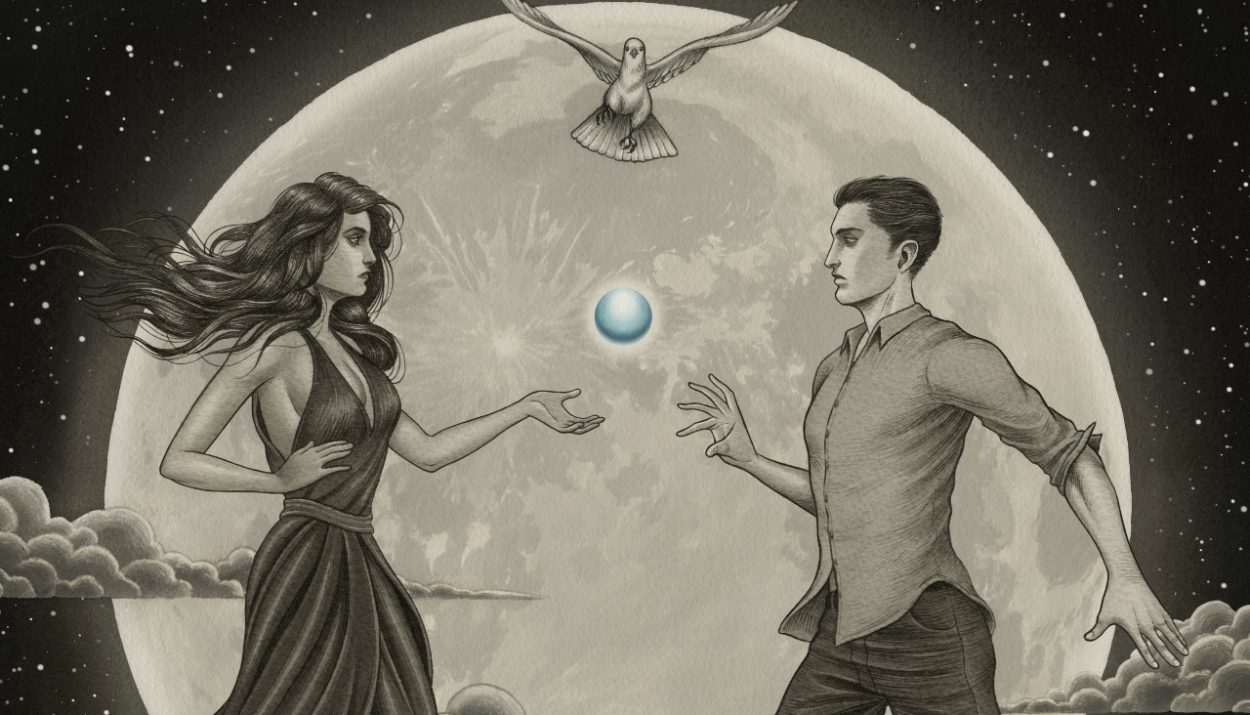There’s a quiet kind of courage in making music that doesn’t demand attention but instead invites stillness. Stephen Foster, a Santa Cruz-based singer-songwriter with roots in classical trumpet has embraced that courage fully on his debut full-length solo album, ‘Sharing Perils.’ Self-produced and shaped with an ear for restraint, melody, and melancholia, the album feels less like a performance and more like an offering: tender, haunted, and achingly human.
Drawing from the intimate vulnerability of Elliott Smith, the hushed grace of The Innocence Mission, the contemplative grit of Damien Jurado, and even cinematic traces of Ennio Morricone, Foster crafts a collection of songs that move like weather: windswept, moody, and illuminated by flickers of light. Trumpets and chimes, acoustic guitars and music boxes, whispers and waltzes—all gather here, threaded by a sense of space and emotional gravity.
The opening track, “Chimes” is a gentle portal into Foster’s world, setting the stage with its delicate textures and understated beauty. Without overwhelming the senses, it builds an atmosphere of wistful clarity. It’s less a song than a moment of pause, a breath before the journey begins.
Drawing its title from Spanish—“After the Flood”— “Después de la Inundación” captures the aftermath of devastation and the slow emergence of something resembling recovery. Its instrumental palette leans into Foster’s cinematic side, with restrained trumpet lines echoing like distant memories, woven into acoustic chords that feel washed clean yet weighted with loss. The absence of lyrics leaves the listener to sit with mood alone, reminding us that some emotions resist words.
Foster steps into irony and melancholy with “George Bailey’s Honeymoon” capturing the restless blur of late nights and fleeting indulgences. With lines like “Stuck around for a boring night. Talking trash ’cos it keeps me company,” he sketches a scene of disconnection and half-hearted attempts at joy. His vocals, subdued yet emotionally precise, imbue ennui with tenderness, especially in the refrain: “Oh you ought to be. Able to sleep tonight. Tired from the fun. That you’ve missed. It’s alright.” Jangling guitars, steady percussion, and a lived-in, unpolished production style give the track an intimate, restless glow.
One of the album’s emotional cores, “The Passing Shadow” meditates on loss, resilience, and fragile hope. Foster’s trembling delivery of lines like “I tried my hardest to make it another year. I wanted to be here but I’m not” is devastating in its honesty, while the fragile optimism of “Morning will rise up again. It’s a matter of point of view” stays like a dim candle. Atmospheric guitars and moody synths ebb and flow beneath his voice, creating a tide-like motion that mirrors the song’s emotional turbulence.
“We Finally Rest” carries the weight of exhaustion and surrender. From the opening lines—“Stayed there for so long, an absentee. Past an intolerable degree,” Foster embodies resignation without falling into despair. His voice is fragile but unwavering, his delivery more lived than performed. Lyrics like “Give light to my eyes. Or I’ll sleep in death” deepen the song’s gravity. Sparse guitars, muted percussion, and reverb-soaked spaces allow the track to feel stark yet enveloping, like a whispered confession echoing in a cathedral.
“Sadie’s Gift” is the album’s reprieve, its tender moment of warmth and fragile light. The arrangement feels almost lullaby-like, with gentle harmonies and delicate acoustic guitar lines carrying a sense of offering. Though quieter in theme than its darker counterparts, its presence in the tracklist feels crucial: a reminder that amid perils, there are gifts of stillness and grace.
Mortality and surrender take center stage in “In the Sea” with lyrics that resonate like a prayer: “Burn me when I am gone. Bury me in the sea.” Foster’s voice is steady yet trembling, steeped in vulnerability. Sparse acoustic strums and subtle piano chords underscore his hymn-like delivery, while atmospheric textures expand the song’s meditative weight. Its beauty lies in its simplicity: silence, space, and a gentle acceptance of inevitability.
“Desolate Cities” is one of the album’s darkest meditations, a brooding exploration of regret and futility. Lines like “up all night, manufacturing regret” and “if I make my bed in hell / will you be there?” carve into you with prophetic urgency. Reverb-drenched guitars stretch into cavernous soundscapes, while the steady pulse of percussion grounds the track in inevitability. Foster’s delivery is weary yet unyielding, embodying the collapse he sings about while refusing to fully succumb.
“Olam” (a Hebrew word often associated with “world” or “eternity”) expands the album’s spiritual undertones. It unfolds like a twilight hymn, its minimal instrumentation leaving room for silence to act as melody. Where words are sparse, atmosphere takes over, and the track becomes an interlude of contemplation—another thread in the record’s tapestry of space and stillness.
At once weary and defiant, “The Light” asks the album’s most existential question: “Will the light burn forever?” Foster delivers the refrain with a gripping blend of fragility and strength, his voice resonant with exhaustion and hope. Atmospheric guitar textures, layered harmonies, and restrained percussion create a backdrop that feels simultaneously intimate and vast. The track becomes both a confession and a universal plea—one of the album’s most affecting moments.
Bleak yet unflinchingly honest, “Anyone, Anymore” explores disillusionment and collapse. “Woke up in coma town. Alive in the dark it would seem” sets a tone of isolation, while “It ain’t like it was before. Don’t feel like fighting anymore” lands with weary sincerity. The instrumentation is sparse and shadowed, guitars and rhythms swelling and retreating like a faltering heartbeat. Foster’s delivery is stripped raw, his voice left intentionally unpolished, so every crack carries weight.
Gentle, nocturnal, and dreamlike, “Slumbertime Waltz” carries us toward the album’s end. Chimes, subtle harmonies, and a lullaby-like cadence provide respite, an exhale after the heaviness of what came before.
The record closes as it began, with “Chimes (Outro)” returning in a softened reprise. It’s a cyclical ending that reminds the listener of the album’s intent: to invite stillness, to dwell in melancholy and melody, to breathe.
Stephen Foster’s voice is the soul of ‘Sharing Perils.’ It is not a voice that dazzles with bravado but one that compels through fragility, precision, and emotional honesty. He sings as if every phrase has been lived, not just written. Sometimes trembling, sometimes tender, sometimes resolute—his delivery ensures the listener feels both the wound and the healing in progress.
Recorded with an ear for space and restraint, the album’s production honors atmosphere over adornment. Guitars shimmer with reverb, percussion pulses gently, and layered harmonies emerge like flickers of candlelight. Classical touches—trumpets, chimes, music boxes—add texture without excess, creating soundscapes that expand and contract like breath. The result is a record that breathes, inviting the listener into silence as much as into song.
With ‘Sharing Perils,’ Stephen Foster has crafted a debut of remarkable depth and beauty—a record that doesn’t clamor for attention but rewards those who lean in. It is an album of shadows and flickers, resignation and resilience, mortality and the fragile glimmer of hope. Foster doesn’t simply sing these songs; he inhabits them, carrying his audience through the long night and back toward the faint promise of morning.
Listen to “Sharing Perils” on Spotify
Follow Stephen Foster on here and his socials; Facebook, Instagram, Bandcamp, YouTube






